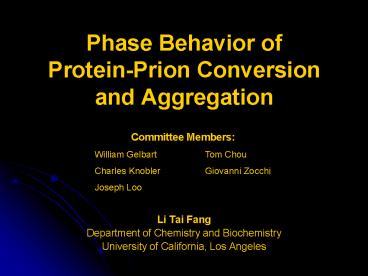Phase Behavior of ProteinPrion Conversion and Aggregation - PowerPoint PPT Presentation
1 / 30
Title:
Phase Behavior of ProteinPrion Conversion and Aggregation
Description:
cause of transmissible spongiform encephalopathies (TSE) ... Electron Micrograph of Yeast Sup35N amyloid. King CY et al, PNAS, 94, 6618-6622, (1997) ... – PowerPoint PPT presentation
Number of Views:31
Avg rating:3.0/5.0
Title: Phase Behavior of ProteinPrion Conversion and Aggregation
1
Phase Behavior of Protein-Prion Conversion and
Aggregation
Committee Members William
Gelbart Tom Chou Charles Knobler Giovanni
Zocchi Joseph Loo
- Li Tai Fang
- Department of Chemistry and Biochemistry
- University of California, Los Angeles
2
What Are Prions
- cause of transmissible spongiform
encephalopathies (TSE) - rogue conformers (PrPSc) of the cellular proteins
(PrPC)
Native Conformer
Misfolded Conformer
Picture Credit Fred E. Cohen
3
Properties of Prions
- Protein-only Hypothesis
- Seeding Model
- Prions aggregate
- Highly hydrophobic
Weismann C, Nature Review Microbiology, 2,
861-871, (2004)
4
Prion Phenomenon Wide Spread?
- Prion-like proteins discovered in
- Yeast
- Sup35
- Ure2
- Fungi
- Het-S
Electron Micrograph of Yeast Sup35N amyloid King
CY et al, PNAS, 94, 6618-6622, (1997)
5
Motivation
- Rare
- vCJD occurs one in a million
- Sup35 prion occurs one in 1-10 million
- Incurable
- Irreversible
- Transmissible
- Kuru
- Mad cow disease
6
Research Proposal
- Ising Model
- Prion model with mathematical formalism
- Experiments using yeast prions
- manipulating the protein-prion equilibrium by
adjusting - Strength of hydrophobic interaction
- Relative stability of the monomeric proteins
7
Ising Model
- N lattice sites, each with 2 possible values
- e.g. 0 or 1
- For the simplest case, only the nearest-neighbors
interact - Phase transition in 2-D or higher
- Monte Carlo solution using Metropolis method
- Try to change one thing at a time, and see if the
change got the system closer to equilibrium
8
Ising Model
- 3-D cubic lattice setup
- 0 native or anything
- 1 prion
- field strength ? F
- coupling constant ? -J
- Total Energy
- Change in Energy
9
Metropolis Method
10
Metropolis Method
- Randomly select one particle
11
Metropolis Method
- Randomly select one particle
12
Metropolis Method
- Randomly select one particle
- Switch the Conformation
13
Metropolis Method
- Randomly select one particle
- Switch the Conformation
14
Metropolis Method
- Randomly select one particle
- Switch the Conformation
- The switch will be accepted if
- ?E lt 0, or
- e-?E a random
- iterate many cycles
15
Metropolis Method
- Equilibrium configuration
- 1 wants to be next to 1
- 1 does not want to be alone
- Transition from 0 dominated to 1-dominated
systems - Phase diagram with respect to F and J .
16
Ising Phase Diagram
17
Experimental Work
Klug, A. et al, Nature, 229, 37-42, (1971)
- Phase diagram tobacco mosaic virus capsid
protein self-assembly - not a conventional phase-diagram
18
Phase Behavior
- Phase diagram for prion formation?
- Thermodynamic process
- Reversible
- Experimental method
- distinguish native and prion conformers in
solution
Hypothetical Protein-Prion Phase Diagram
19
Circular Dichroism
- Chiral molecules absorb left- and right-
circularly polarized light differently - Light comes out elliptic (CD) and rotated (ORD)
- Widely used to estimate protein secondary
structures
Animations adapted from András Szilágyi URL
http//www.enzim.hu/szia/cddemo/
20
Circular Dichroism
- CD at far UV range is sensitive to protein
secondary structures - Native proteins and prions differ in secondary
structures
CD spectra of native (black) and prion (white)
conformers of yeast Sup35N King CY et al, PNAS,
94, 6618-22, (1997)
21
Protein Concentration
- Micelle formation
- monomers N ? micelles
- Prion formation
- PrPC N ? PrPScN
- critical prion concentration
22
Critical Aggregation Concentration
- Phase-transition-like
- sharp transition
- thermodynamic behavior
- Not a true phase-transition
- CMC is a geometric argument
- Slope is continuous
23
Hydrophobicity of Prions
- Strength of hydrophobic interaction
- increases with temperature
- increases with ionic strength
Graph plotted with data from Ben-Naim, A. et al.,
J. of Phy. Chem., 78, 170-175, (1973)
24
Ionic Strength
- Ionic strength increases the strength of
hydrophobic interaction - Lowers the critical prion concentration?
25
Temperature
- Hydrophobic interaction increases with
temperature - Prusiner et al. kept his prion fraction at 4oC to
prevent aggregation
26
pH relative stability
Native Conformer
Misfolded Conformer
- Alters the chemical properties of the amino acid
residues - Alters the amino acid interactions
- Alters the relative stability
27
pH relative stability
Native Conformer
Misfolded Conformer
- Alters the chemical properties of the amino acid
residues - Alters the amino acid interactions
- Alters the relative stability
28
Experiments and Ising Model
- Experimental phase diagram vs.
Theoretical phase diagram
29
Concluding Remarks
- Experimentally, can you change the favored state
by changing environment? - Is Ising model a good model
- Phase behavior captured?
- Learn the physics of prion formation
30
Acknowledgement
Committee
- Charles Knobler
- William Gelbart
- Joseph Loo
- Giovanni Zocchi
- Tom Chou
Dept. of Chemistry and Biochemistry Dept. of
Chemistry and Biochemistry Dept. of Chemistry and
Biochemistry Dept. of Physics and Astronomy Dept.
of Biomathematics
- Ajay Gopal
- Yufang Hu
- Ajay Gopal, Aron Yoffe, Glenna Sowa, Odisse
Azizgolshani
Written proposal
Oral Presentation






























